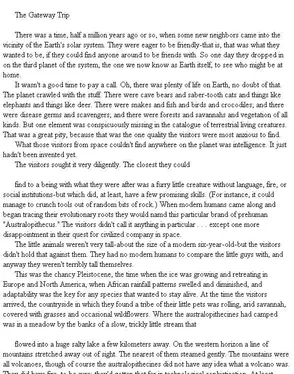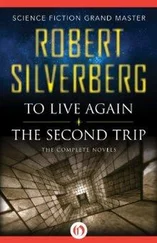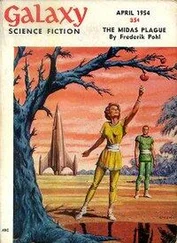Pohl, Frederik - The Gateway Trip
Здесь есть возможность читать онлайн «Pohl, Frederik - The Gateway Trip» весь текст электронной книги совершенно бесплатно (целиком полную версию без сокращений). В некоторых случаях можно слушать аудио, скачать через торрент в формате fb2 и присутствует краткое содержание. Жанр: Старинная литература, на английском языке. Описание произведения, (предисловие) а так же отзывы посетителей доступны на портале библиотеки ЛибКат.
- Название:The Gateway Trip
- Автор:
- Жанр:
- Год:неизвестен
- ISBN:нет данных
- Рейтинг книги:4 / 5. Голосов: 1
-
Избранное:Добавить в избранное
- Отзывы:
-
Ваша оценка:
- 80
- 1
- 2
- 3
- 4
- 5
The Gateway Trip: краткое содержание, описание и аннотация
Предлагаем к чтению аннотацию, описание, краткое содержание или предисловие (зависит от того, что написал сам автор книги «The Gateway Trip»). Если вы не нашли необходимую информацию о книге — напишите в комментариях, мы постараемся отыскать её.
The Gateway Trip — читать онлайн бесплатно полную книгу (весь текст) целиком
Ниже представлен текст книги, разбитый по страницам. Система сохранения места последней прочитанной страницы, позволяет с удобством читать онлайн бесплатно книгу «The Gateway Trip», без необходимости каждый раз заново искать на чём Вы остановились. Поставьте закладку, и сможете в любой момент перейти на страницу, на которой закончили чтение.
Интервал:
Закладка:
The Gateway Trip
There was a time, half a million years ago or so, when some new neighbors came into the vicinity of the Earth's solar system. They were eager to be friendly-that is, that was what they wanted to be, if they could find anyone around to be friends with. So one day they dropped in on the third planet of the system, the one we now know as Earth itself, to see who might be at home.
It wasn't a good time to pay a call. Oh, there was plenty of life on Earth, no doubt of that. The planet crawled with the stuff. There were cave bears and saber-tooth cats and things like elephants and things like deer. There were snakes and fish and birds and crocodiles; and there were disease germs and scavengers; and there were forests and savannahs and vegetation of all kinds. But one element was conspicuously missing in the catalogue of terrestrial living creatures. That was a great pity, because that was the one quality the visitors were most anxious to find.
What those visitors from space couldn't find anywhere on the planet was intelligence. It just hadn't been invented yet.
The visitors sought it very diligently. The closest they could
find to a being with what they were after was a furry little creature without language, fire, or social institutions-but which did, at least, have a few promising skills. (For instance, it could manage to crunch tools out of random bits of rock.) When modern humans came along and began tracing their evolutionary roots they would namd this particular brand of prehuman "Australopithecus." The visitors didn't call it anything in particular . . . except one more disappointment in their quest for civilized company in space.
The little animals weren't very tall-about the size of a modern six-year-old-but the visitors didn't hold that against them. They had no modern humans to compare the little guys with, and anyway they weren't terribly tall themselves.
This was the chancy Pleistocene, the time when the ice was growing and retreating in Europe and North America, when African rainfall patterns swelled and diminished, and adaptability was the key for any species that wanted to stay alive. At the time the visitors arrived, the countryside in which they found a tribe of their little pets was rolling, arid savannah, covered with grasses and occasional wildflowers. Where the australopithecines had camped was in a meadow by the banks of a slow, trickly little stream that
flowed into a huge salty lake a few kilometers away. On the western horizon a line of mountains stretched away out of sight. The nearest of them steamed gently. The mountains were all volcanoes, though of course the australopithecines did not have any idea what a volcano was. They did have fire, to be sure; they'd gotten that far in technological sophistication. At least, most of the time they did, when lightning started grass burning (or even when hot ash from an eruption kindled something near them, though fortunately for the peace of mind of the little people that didn't happen often). They didn't use fire for much. They had not yet considered the possibility of cooking with it, for instance. What they found it good for was keeping large nocturnal predators away, at which it sometimes succeeded.
By day they could take pretty good care of themselves. They carried stone "hand axes"-not very elaborate, just rocks chipped into more or less the shape of a fat, sharp-edged clam-and clubs that were even less impressive looking: just the unmodified long leg bones of the deerlike grazers they liked to eat. That sort of weapon would never stop a saber-tooth. But enough of them, wielded by enough of the screaming little ape-men, could usually deter the hyenas that were the savannah's fiercest predators, especially if the little folk had first discouraged the hyena pack by pelting it with
rocks from a distance. They didn't usually succeed in killing the hyenas, but most of the time they did convince the animals that their time would be better spent on more defenseless prey.
The little people did lose a baby to a carnivore now and then, of course, or an old person whose worn-out teeth were making his or her life chancy anyway. They could stand that. They seldom lost anyone important to the well-being of the tribe-except when hunting, of course. But they didn't have any choice about taking the risks of the hunt. They had to hunt to eat.
Although the australopithecines were tiny, they were quite strong. They tended to have pot bellies, but the gluteus maximus was quite small-even the females had no hips to speak of. Their faces were not very human: no chin worth mentioning, a broad nose, tiny ears almost hidden in the head fur-you wouldn't call it hair yet. An average australopithecine's skull did not have room for any large supply of brains. If you poured the brains out of his sloped skull into a pint beer mug, they would probably spill over the edge, but not much.
Of course, no modern beer drinker would do that, but one of the little furry people might have-gladly. In their diet, brains were a delicacy. Even each other's.
The visitors didn't think much of the furry people's eating habits. Still, the creatures had one anatomical characteristic that interested the visitors a lot-in a sort of winky-jokey way, with sexual overtones. Like the visitors, the australopithecines were bipeds. Unlike the visitors, their legs were positioned so close to each other that they actually rubbed together at the thighs when they walked-and for the males, at least, that seemed to the visitors to present real problems, since the male sexual organs hung between the thighs.
(Some hundreds of thousands of years later, the then paramount denizens of Earth, the human race, would ask themselves similar questions about the long-gone visitors ... and they, too, would fail to understand.)
So the visitors from space looked the little furry creatures over for a while, then chirruped their disappointment to each other, got back in their spaceships, and went glumly away.
Their visit had not been a total loss. Any planet that bore life at all was a rare jewel in the galaxy. Still, they had really been hoping for a more sophisticated kind of life-someone to meet and be friends and interchange views and have discussions with. These little furry animals definitely weren't up to any of that. The visitors didn't leave them quite untouched, though. The visitors had learned, from dismal experience, that faintly promising species of creatures might easily die off, or take a wrong turning somewhere along the evolutionary line, and so never realize their promise. So the visitors had a policy of establishing a sort of, well, call them "game preserves." Accordingly, they took a few of the australopithecines away with them in their spaceships when they left. They put the little beasts in a safe place, in the hope that they might amount to something after all. Then the visitors departed.
Time passed . . . a lot of time.
The australopithecines never did get very far on Earth. But then their close relatives-the genus Homo, better known as you and me
and all our friends-came along. The genus Homo people worked out a lot better. Over some five hundred thousand years, in fact, they did just about all the things the visitors had hoped for from the australopithecines.
These "humans," as they called themselves, were pretty clever at thinking things up. As the ages passed they invented a lot of neat stuff-the wheel, and agriculture, and draft animals, and cities, and levers and sailing ships and the internal combustion engine and credit cards and radar and spacecraft. They didn't invent them all at once, of course. And not everything they invented turned out to be an absolute boon, because along the way they also invented clubs and swords and bows and catapults and cannon and nuclear missiles. These humans had a real talent for messing things up.
Читать дальшеИнтервал:
Закладка:
Похожие книги на «The Gateway Trip»
Представляем Вашему вниманию похожие книги на «The Gateway Trip» списком для выбора. Мы отобрали схожую по названию и смыслу литературу в надежде предоставить читателям больше вариантов отыскать новые, интересные, ещё непрочитанные произведения.
Обсуждение, отзывы о книге «The Gateway Trip» и просто собственные мнения читателей. Оставьте ваши комментарии, напишите, что Вы думаете о произведении, его смысле или главных героях. Укажите что конкретно понравилось, а что нет, и почему Вы так считаете.












